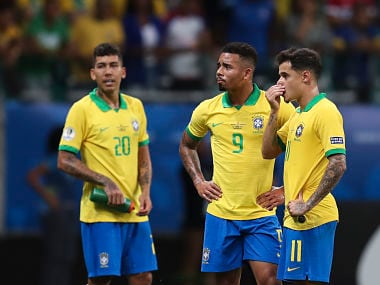São Paulo: An eerie silence engulfed the Morumbi, an iconic, bowl-shaped stadium in the south of the Paulista capital; in a slow-burning match Brazil were struggling to break down Bolivia, the sacrificial altitude minnows of the continent. The iconic yellow shirt dominated the stands with pockets of white here and there, a reference to Brazil’s Copa America win in 1919. Some said it was an expression of patriotism, others thought less of it. This was not the return premium tickets were supposed to get you. At half time with no goals, the Brazilian players were jeered off. It was the first time the asphyxiating silence had been broken, except for cries of ‘Bicha’, a homophobic insult at the address of Bolivian goalkeeper Carlos Lampe. In the futebol nation par excellence, almost 50,000 people had sat in silence for 45 minutes watching their favourite sport in a state of utmost lethargy. The mayhem and passion so associated with the South American game, one of the last bastions of uncontrolled madness, had been shackled by a Ray Ban crowd, who needn’t sweat over the upmarket tickets priced at 590 reais, or about 60 per cent of a minimum monthly salary in Brazil. [caption id=“attachment_6844541” align=“alignleft” width=“380”]  Brazil have one win and a draw after two matches at the Copa America. (AP)[/caption] The game was an event that could be shared on social media, a status symbol, even more so with the attendance of the president they so liked: Jair Bolsonaro, a homophobic, xenophobic, sexist strong-man who is even more morose than his American counterpart Donald Trump. Perhaps Bolsonaro chuckled when he heard ‘Bicha.’ At the 2016 Rio Olympic Games, Brazilians had also booed, jeered and chanted whatever and whenever they wanted to. The Sao Paulo brigade of consumers was not so different: rich, privileged and entitled, and thus not averse to lawlessness in the form of homophobic abuse. On matchday a general strike had hamstrung Sao Paulo, Latin America’s biggest city, in protest at Bolsonaro’s proposal to raise the retirement age for Brazilian workers. With schools and the subway closed, the Paulista capital was sparred from the commuter chaos that grinds the city to a daily standstill. But even so little suggested a major football tournament was about to kick off. In Rio de Janeiro, traveling Peruvians, Chileans, Colombians and Uruguay had chosen Copacabana as their hub. Beachside bars and botecas had the matches on, but Brazilians watched with latent interest and a nostalgic glow in their eyes, signaling that Tite’s Seleção doesn’t represent them and that this tournament isn’t theirs. Football has always been a barometer of Brazilian society, one of the most unequal in the world: the Seleção has always carried the burden of representing Brazil as a success on the international stage and the various triumphs and nadirs are attached with significant, cultural importance. At club level the game’s tribalism highlights social and ethnic divides: in Rio the white middle and upper class support Fluminense and the masses root for Flamengo. The same division applies to Sao Paulo and Corinthians. In a time of economic downturn, rising unemployment, soaring crime rates and with the global focus having shifted eastwards after staging global sporting blockbusters in 2014 and 2016, the importance of the Seleção should take a flight again, but with disappointing results, uninspiring performances and a Conmebol-led gentrification inside the stadiums, the disconnect between the Brazilian team and the local fans has been enormous. The South American governing body’s money grab through inflated ticket prices has also alienated fans in other host cities. Should Brazilians mind Luisito and Edinson Cavani forming a potent strike force for tournament favourites Uruguay or Argentina playing gung-ho football in a disastrous design of caretaker manager Lionel Scaloni and thus ruining his namesake’s quest for international silverware? The 21st century GOAT has been very subdued on Brazilian soil, defying the very idea that he is indeed football’s supreme player. Visiting fans have been few and far as well. Recently, spending power across South America has increased, highlighted by the mass exoduses for the last two World Cup. Since the 2011 Copa America, fans from across the ten local participating countries have travelled in greater numbers, a stark contrast with previous editions in the early noughties. Those iterations of the Copa America were even more low-key, but had a distinct local touch. In Brazil, Conmebol have commodified the continental tournament, but having failed to ignite the Copa America is meandering slowly towards the end of the group stages. Throughout the first week this tournament has felt like the one too many after the 2015 and 2016 editions with another Copa America slated for next year in Colombia and Argentina. Major tournaments tend to form an identity of their own after a few days - the intoxicating unpredictability, and warped hospitality, in Russia, reestablishing the international football as the pinnacle of the game; the family-friendly awakening of women’s football in France, but, the Copa America, just like the host country and its national team, is experiencing an identity crisis. The vacuum could still be filled come the knockout stages and Brazil’s obligation to play at full throttle. Yet one can’t help but feel that Brazilians, and rightly so, have other things on their mind than the swagger of a football tournament - and the rest of the continent is simply suffering from Copa fatigue.
In a football mad Brazil, fans have stayed away from attending games owing to expensive tickets as saturation point hits with third Copa America in five years.
Advertisement
End of Article


)

)
)
)
)
)
)
)
)



